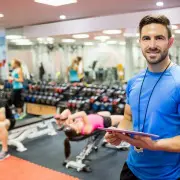10 Tips for Your Offseason Training
While it may not feel like it, the off season can be just as critical to success as the regular season itself. Even though you may not be competing, the off season presents the perfect opportunity to up your game, so we’ve rounded up 10 tips to help you take your off season training to the next level. What are you waiting for? Grab your sports guard and get training!
- Review your past performance.
Assuming that you are planning to compete competitively in the upcoming season, the off season marks the perfect time to review your past performance and identify any weaknesses. Review your recent competitions and practices to see if you can identify any patterns in your activity. Looking them over with your personal coach or trainer (if you have one) will allow you to get an outside opinion and see your performance with new eyes.
- Set goals for your training.
During the off season, you need more concrete training goals than a vague aim of staying in shape. Based on your performance review, identify a couple goals that could help improve your performance: building your strength, improving your stamina, increasing your speed, enhancing your balance, increasing your flexibility, and so on. Then design an off-season training regimen that is specifically created to help you work on these goals. Make sure that you set some measurements for yourself to keep track of your progress, too.
- Consult with an expert.
If you don’t normally work with a coach or personal trainer one-on-one, then the off season is a great time to change that. Getting personalized help from an expert, even if just for a few weeks or months, can give you the boost you need to take your training to the next level. If you feel like you’ve plateaued on your own, then ask your fellow athletes for recommendations for trainers who they trust, and book a few sessions to see how it goes.
- Do something different.
Many athletes are understandably hesitant to try a new exercise or workout during the regular season. What if it doesn’t help their performance or, even worse, impacts their performance negatively? That’s why the off season is the perfect time to experiment with a new training regimen that you wouldn’t want to risk when you’re regularly competing. If you feel like you got into a training rut during the season, now is the perfect time to try to snap yourself out of it.
- Perfect your form.
The off season is a great time to get technical and really focus on the small details. Go back to basics and really focus on your form, whether that’s on a deadlift or a tennis serve. Take things slow and focus on doing them right instead of fast. Even minute changes in your form can significantly enhance your performance during the season, especially once you practice them so often they become second nature.
- Focus on active recovery.
Yes, the off season is all about recovery, but that doesn’t mean that you should hang up your moldable mouth guard for good and spend your days only sitting on the couch. Instead, focus on active recovery, such as yoga, that will strengthen your body and improve balance and flexibility without exhausting you physically the way the season does. You should include a couple of low-intensity days each week for active recovery to make it a regular part of your training schedule.
- Stay consistent with workouts.
During the off season, many athletes (especially aspiring pros in high school or college) tend to slack off and do less and less training as their break wears on. It can be especially hard to keep going in winter, when the days are shorter and the weather is colder, which can make it difficult or even impossible to train outside. That’s why it’s so important to make a schedule and stick with it: Having a plan ahead of time will encourage you to stay consistent instead of skipping your workouts often.
- Prioritize function, not aesthetics.
It’s tempting to take the off season to slim down, bulk up, or otherwise embark on a training regimen that will help you achieve peak beach body. However, if you’re serious about your sport, then you should use the off season to focus on function over aesthetics. For instance, big muscles will do you no good — and may even hinder your performance — if you’re an endurance athlete who needs to be able to go the distance during the season.

- Upgrade your gear.
The off season is also the ideal time to upgrade your gear and get used to it before the season starts, such as breaking in new shoes and customizing a new boil and bite mouthguard. Examine all of your gear for damage it has sustained during the off season. Repair it if you can. If it can’t be salvaged, then toss it and replace it. Make sure to take your new gear out for practice runs before the season starts so you can get used to it and adjust your playing style as needed.
- Don’t forget to rest.
While it’s true that you shouldn’t spend the entire offseason loafing around, most athletes like to take between two and four weeks completely off from scheduled training. They may do some light workouts as they feel like it, but they mostly spend this time resting their bodies, as well as de-stressing mentally after the pressure of the season. Make sure that you set aside some time at the beginning of your off season to decompress — then dive back into your offseason training.
Photos by Shutterstock.com
